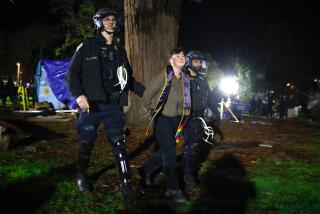A Boyhood Before Berkeley Became Berkeley : COMING TO TERMS A Study in Memory and History<i> by Henry F. May (University of California Press: $25; 319 pp.) </i>
- Share via
In 1926, as an inquisitive 11-year-old, Henry May accompanied his Berkeley, Calif., family on a one-year trip to Europe. He was successively a guest at Tresillian, his maternal grandmother’s country house in England, and a wide-eyed tourist in France. Back in America, the boy found himself seduced by a sense of the past awakened by his trip. “Wet smells could bring back the garden at Tresillian, cold winds recalled the pale-gray embankments of the Seine, spring rains the fruit trees blooming in cracks in the medieval towers of Villeneuve. . . . As to my own country, my feelings about that were challenged and deeply stimulated. Working them out was to take much of my life.”
That 11-year-old grew up to be a distinguished expert on American intellectual history. (He is now an emeritus professor at the University of California.) This unusual book is his venture into family history. In it, May consciously runs a double risk, parlaying two methods traditionally regarded as antithetical--the first person Herodotean account and the third-person Thucididean reconstruction.
He begins by re-creating the lost world of his genteel childhood in 1920s Berkeley. Here as later, the dominant figure is the head of household, Harry May, 55 years old at the time of Henry’s birth. The author’s earliest memories of his father are of a rather gloomy and unapproachable old man. The senior May gradually comes into focus as a reserved New Englander weighed down by financial setbacks and the decline of a once-successful legal career. Part of Henry May’s motivation in writing this book, one suspects, may have been to “come to terms” with a misunderstood and unloved parent. His distant, sad father clearly appeals less to the boy than does his young English mother--shy, proper, but affectionate with her children, and, like her husband, the representative of a vanished 19th-Century culture.
An older brother and sister and a devoted German-American maid round out the May family. Cradled in the “secure citadel” of this household (the extended family consists of similarly staunch Anglo-Saxon Protestants), young Henry has little traffic with the immigrant Italians and Finns or blacks who populate the common flatlands below Berkeley’s gentle hills. The single black man on whom he actually lays eyes is the one who shines commuters’ shoes; Italians are “gardeners or vegetable dealers.” At school, however, he learns democracy stretches beyond the Anglo-Saxons. His egalitarian instincts aroused, he hurries home to demonstrate on behalf of the worker’s rights of the family maid.
A painful awareness of social injustice burns on as May grows into earnest adulthood. The book’s account of college years at Berkeley and Harvard documents the acute social conscience of May’s intellectual generation, coming of age under the influence of the appealing left-wing politics of the 1930s. Wary of “group programs,” May here remains a “fellow traveler” through his Harvard period, divided agonizingly between political commitment and conflicting spiritual commands.
The historian traces his own “strong compulsion to moral and intellectual rigor and even stronger tendency to self-doubt” back to his father’s ancestors, strict Calvinist settlers of 17th-Century Massachusetts who are the subject of the second part of his book. Dropping “the mode of memory” for “the mode of history,” May examines family documents and dusty correspondences to resurrect those god-fearing, law-abiding, guilt- and duty-bound progenitors. The dry documentary approach here carries a peculiar emotional burden. In the third and final part of the book, a return-to-memory treatment of the author’s growth into maturity, that rattle of old ghosts in the research closet lingers on as a haunted--and haunting--tonal edge.
May’s methodological gamble pays off. Out of his mixture of subjective and objective forms, affectionate nostalgia and dispassionate assessment, he achieves a unique autobiographical reflection that illuminates not only a single life but the lives of forebears followed all the way back into the darkness of the genetic forest.
More to Read
Sign up for our Book Club newsletter
Get the latest news, events and more from the Los Angeles Times Book Club, and help us get L.A. reading and talking.
You may occasionally receive promotional content from the Los Angeles Times.










